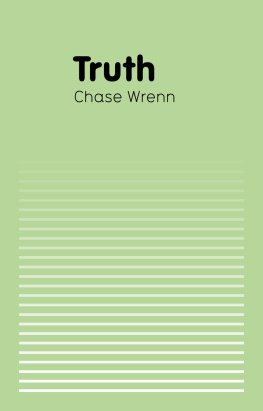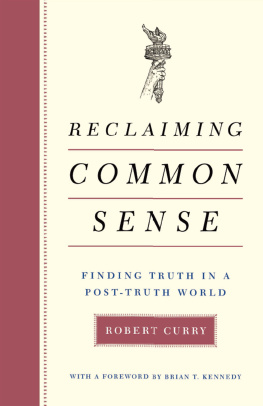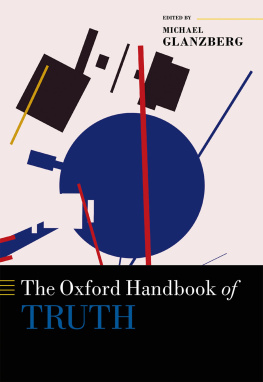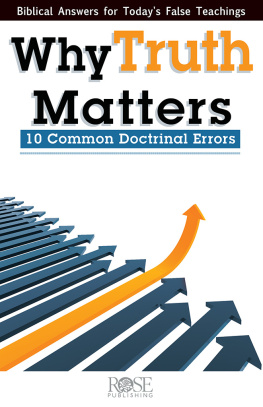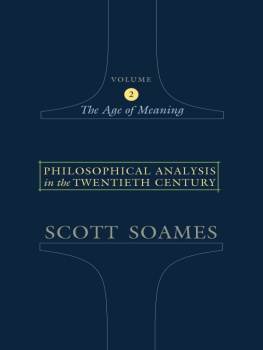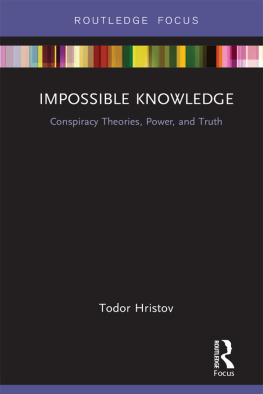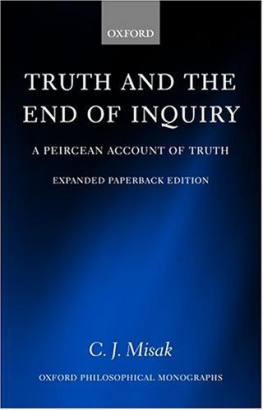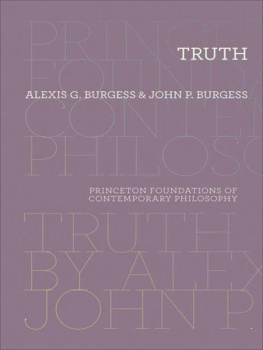
Table of Contents
Key Concepts in Philosophy Series
Heather Battaly, Virtue
Lisa Bortolotti, Irrationality
Joseph Keim Campbell, Free Will
Roy T. Cook, Paradoxes
Douglas Edwards, Properties
Bryan Frances, Disagreement
Douglas Kutach, Causation
Ian Evans and Nicolas D. Smith, Knowledge
Daniel Speak, The Problem of Evil
Josh Weisberg, Consciousness
Copyright Chase Wrenn 2015
The right of Chase Wrenn to be identified as Author of this Work has been asserted in accordance with the UK Copyright, Designs and Patents Act 1988.
First published in 2015 by Polity Press
Polity Press
65 Bridge Street
Cambridge CB2 1UR, UK
Polity Press
350 Main Street
Malden, MA 02148, USA
All rights reserved. Except for the quotation of short passages for the purpose of criticism and review, no part of this publication may be reproduced, stored in a retrieval system, or transmitted, in any form or by any means, electronic, mechanical, photocopying, recording or otherwise, without the prior permission of the publisher.
ISBN-13: 978-0-7456-6323-4 (hardback)
ISBN-13: 978-0-7456-6324-1 (paperback)
ISBN-13: 978-0-7456-8814-5 (epub)
ISBN-13: 978-0-7456-8813-8 (mobi)
A catalogue record for this book is available from the British Library.
The publisher has used its best endeavors to ensure that the URLs for external websites referred to in this book are correct and active at the time of going to press. However, the publisher has no responsibility for the websites and can make no guarantee that a site will remain live or that the content is or will remain appropriate.
Every effort has been made to trace all copyright holders, but if any have been inadvertently overlooked the publisher will be pleased to include any necessary credits in any subsequent reprint or edition.
For further information on Polity, visit our website: politybooks.com
For Ron Medlin and the late Robert C. Walker, as promised in 1992.
Preface and Acknowledgments
This book aims to provide an accessible overview of the philosophical debates concerning the metaphysics of truth. It focuses on three sets of issues. First, and most centrally, is the question of the nature of truth. What does it mean for a claim to be true, and is there anything true claims have in common that makes them true? Second is the question of objectivity. Are there claims whose truth is mind-independent, or does truth always depend on what people believe or what could be known? Third is the question of truth's value. How, if at all, is it better for beliefs to be true than false?
I have tried throughout this book to presuppose only as much background knowledge of logic and philosophy as a third- or fourth-year undergraduate would have. Consequently, I have generally avoided technical issues arising in connection with the semantic paradoxes (such as that posed by This sentence is false) and the formal details of alternatives to classical logic. Where necessary, discussion of those issues proceeds informally and omits many technical details. Burgess & Burgess (2011) is an excellent resource for those who are interested in how the semantic paradoxes and other issues in philosophical logic bear on the metaphysical problems discussed in this book.
The heart of this book () surveys correspondence, epistemic, deflationist, and pluralist accounts of truth. These chapters explain what motivates the theories, as well as some of their most important advantages and disadvantages. The final, eighth chapter sets aside the pros-and-cons approach and argues for the superiority of the deflationary approach to its main rivals, correspondence and pluralist theories. My hope is that that chapter will advance the debates discussed earlier in the book and thereby give students a glimpse of how they can be carried forward.
I owe thanks to Michael Lynch for encouraging me to write this book, and to my editor, Emma Hutchinson, for her help throughout the process. The book itself has been greatly improved by fruitful discussions with a number of people, especially Michael Horton and Jeremy Kelly, whose detailed comments and criticism were invaluable. Two anonymous readers for Polity Press also provided comments that helped to make this book much better than it would have been otherwise.
Feedback from the students in my 2013 seminar on truth at the University of Alabama played a crucial role in the final revisions of this book. I am very grateful to those students, including Marissa Abrams, Mitchell Dykstra, Trevor Gant, Madaline Hargrove, Trent Moore, Patrick Norton, Matthew O'Brien, Samuel Rankin, Michael Reagan, Hunter Rodriguez, and Tiffany Simms. Thanks are also due to my research assistants, Mitchell Dykstra and Matthew O'Brien, for their excellent help in preparing the manuscript.
What is Truth?
It is true that the earth is closer to the sun in the northern hemisphere's winter than in the northern hemisphere's summer. It is not true that the Himalayas are older than the Appalachians. What's the difference? What does it mean for something to be true, or for it not to be? What, to be succinct, is truth? This book is about some of the ways philosophers have tried to answer that question.
As is often the case, answering the question requires us first to get clear about what it means. There are some common confusions about truth that can get in the way of making progress toward explaining what it is. The purpose of this chapter is to clear away some of those confusions and to set the stage for the rest of the book.
1.1 Truth and the Truth
The question, What is truth? strikes some people as one of the deepest and most elusive philosophical questions. Some people seem to think it is all but unanswerable. They might think knowing what truth is would mean knowing everything there is to know, or knowing the ultimate secrets of the universe the explanations of everything puzzling, strange, surprising, wonderful, mysterious, or confusing in the world. Knowledge of the nature of truth then seems to be a kind of mystic wisdom that might be possible for gods and prophets, but not for us ordinary people.
Fortunately for philosophers interested in truth, that view is mistaken. It derives from a couple of different confusions. One is to confuse truth with the universe or reality as a whole. But truth is not the universe. It is a property had by the claim that chickens hatch from eggs and lacked by the claim that amphibians have fur. Explaining the nature of truth means explaining the nature of that property, not explaining the universe as a whole.
A second confusion that makes What is truth? seem to require mystical insight is the idea that answering the question means knowing all the most important and fundamental things. This idea might confuse the question What is truth? with the similar sounding question, What is the truth?.
Ordinarily, if you want to know the truth, you want to know the truth about something in particular. You want to know whether your romantic partner is faithful, or when the train is scheduled to depart, or how the new welfare policies will affect the economy. Unless you are asking about some topic that is already philosophical, What is the truth? is not usually a philosophical question.
Sometimes, though, someone might ask what the truth is, and mean something very general. Such a person wants to know the truth about everything, either by knowing all there is know, or by knowing deep principles that explain everything there is to explain. This is probably impossible. We humans are incapable of omniscience, and there probably are no deep principles that explain absolutely everything, apart from the most fundamental laws of nature. Thus it might be impossible to answer the most general version of the question What is the truth?. But What is truth? is a very different question. Its answer need not tell us everything there is to know, or enable us to understand everything there is to understand. All it needs to do is to explain a certain property that 2 + 2 = 4 and Canada is north of Mexico have in common but Seven is an even number and France is an island lack.

